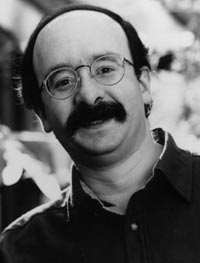Putting people before profits
The way this year’s Weinstock lecturer, Amory Lovins, crunches the numbers, the bottom line — for capitalists as much as for conservationists — depends on taking nature into account
| 05 November 2008
 Amory Lovins
Amory Lovins BERKELEY — Amory Lovins loves capitalism. It’s the waste, inefficiency, and stupidity of many of today’s capitalists he can’t stand.
Tomorrow’s capitalists, he insists, will be different. That’s because those who fail to evolve won’t survive. The future, he says, belongs to “natural capitalism,” which values not just money and goods — the holy grail for industrial capitalists — but also people and nature. The latter are forms of capital that traditional capitalism “typically ignores and often just liquidates.”
“Of course, without people there’s no economy, and without nature there are no people,” he told a standing-room-only campus audience last week. “So this is a material omission. It turns out if you play with a full deck, and you proactively use and reinvest in all four kinds of capital and not just two, you make more money, have more fun, and do more good.”
A sustainable future, he added, depends on adherence to what he calls “the Golden Rule” of natural capitalism: “We all live downwind of the products we make.”
Lovins is the chairman and chief scientist of the Rocky Mountain Institute, which he co-founded in 1982. In contrast to conventional think tanks, RMI has made a point of putting its sustainable-business theories into practice, establishing demonstration projects that include Lovins’ home near the village of Snowmass, Colo. (elevation 6,847 feet), where temperatures can plummet to minus-47 degrees Fahrenheit. Thanks to intelligent design — the human variety, that is — the 4,000-square-foot house uses about the same amount of energy as a conventional light bulb.
Lovins was at Berkeley to give the Barbara Weinstock Lecture on the Morals of Trade, sponsored annually by the Graduate Council. Latecomers to Barrows Hall’s Lipmann Room might well have thought they’d wandered into a luncheon presentation by a corporate CEO, given Lovins’ flat delivery and affinity for business models and bottom lines.
But Lovins, a Harvard and Oxford dropout and the author of 29 books, is a prophet of what he’s dubbed “the next industrial revolution” — an era in which the emphasis must no longer be on using people more productively, as during the 18th and 19th centuries, but on using nature more productively.
It was Paul Hawken, his co-author on the 1999 book Natural Capitalism, who coined the term, Lovins said. “I think he had in mind not just that this is a form of capitalism that takes natural capital seriously — not just physical and financial — but also that capitalism as we know it today, and as we see it daily illustrated in the headlines, is unnatural, is a temporary aberration — not because it’s capitalist, but because it liquidates and doesn’t value its most valuable forms of capital, and thus violates its own precepts. It’s internally inconsistent.”
For nearly 90 minutes, Lovins went on to run through a litany of business failures — notably in the automobile, airline, and energy industries — and to point to examples of innovations that show why “protecting the climate is profitable,” from Zipcars to low- and no-carbon “micropower” generators.
Small, decentralized power sources, said Lovins — such as wind farms — make far more sense than “big, slow, lumpy ones,” including nuclear plants, which even many environmentalists have come to embrace as an alternative to fossil fuels.
Nuclear energy, he said, is “the costliest of low- or no-carbon resources,” making it a far less efficient way to cut greenhouse gases than renewable energy sources like wind and solar. The exorbitant, steadily escalating cost of nuclear power, he added, explains why “nobody has put a penny” into the industry despite the availability of “100 percent subsidies.”
Waste, from Lovins’ perspective, is “a vast business opportunity” — a chance to implement “radically simplified manufacturing,” “integrative design,” and “systematic efficiency” in the interests of a more sustainable planet.
That might sound like idealism to some. To Lovins, it’s an essential element of 21st-century capitalism.
“In a natural-capitalist system,” he said, “we grow more, mine less, and extract a great deal less of what we need through comprehensive, systematic resource efficiency that affects how we harvest, how we manufacture, how we use” goods and services. Then “we close the loops” in manufacturing and recycling “so we almost eliminate what’s thrown away.”
Under natural capitalism, he added, “we also design out toxicity” and plow money saved by eliminating waste back into natural capital — that is, people and nature.
“This,” said Lovins, “is a world where conventional environmental regulation starts to become pretty anachronistic, because the companies that most need it will probably by then be out of business, having spent too much time and money making things that nobody wants — making things that in the 20th century we used to call wastes and emissions.
“Now we have a better term,” he said. “We call them ‘unsaleable production.’ ”

